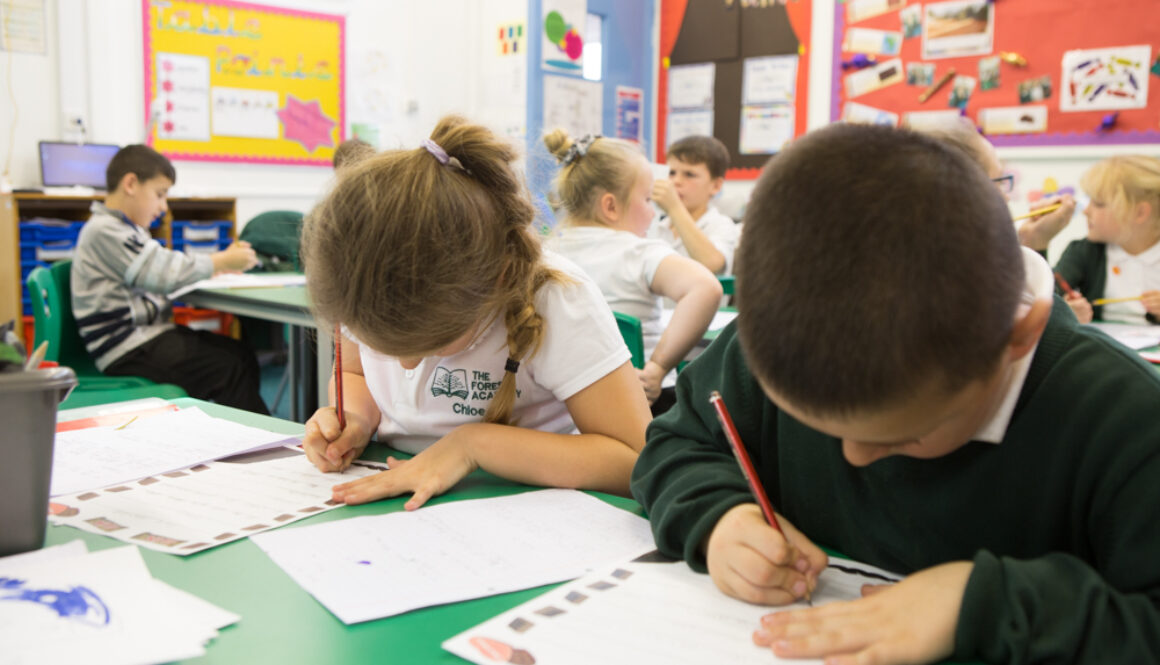Supporting Reluctant Writers
By Adele Lowery & Mia Sneyd
Writing provides children with a vehicle to express who they are as people and to actively engage in daily life. Writing makes children’s thinking and learning visible and permanent. It provides children with opportunities to explain and refine their ideas to others and themselves.
Primary Data 2023
– 73% of pupils met the expected standard in reading (down from 75% in 2022)
– 71% of pupils met the expected standard in writing (up from 69% in 2022)
– 73% of pupils met the expected standard in maths (up from 71% in 2022)
Why do we think writing is the lowest out of the three subjects in Primary? What are we doing about this and how can we support our reluctant writers?
Findings from the National Literacy Trust’s 2023 Annual Literacy Survey, exploring children and young people’s writing enjoyment at school and in their free time, show that enjoyment of writing for children aged 8 to 18 is at one of the lowest levels they have evidenced since 2010.
Reluctant writers are usually reluctant and lack enjoyment because they find writing difficult. The reason writing is difficult for them and how to support them can vary.
The Importance of Automaticity
Writing is a highly complex process that requires certain skills to be performed automatically (without conscious thought) to be successful. Each person only has a certain amount of cognitive energy. In order to successfully write, we need to be able to perform a number of tasks simultaneously. When we can only think about one thing at a time, we need to develop some of these tasks to automaticity to give our full attention to the most important parts of writing. That is language and delivering a meaningful message.
Areas of Difficulty that impact on automaticity
Handwriting: When children are spending cognitive energy figuring out how to form individual letters, they are not able to think about:
• Spelling
• Sentence structure
• Language choices
This can result in a very frustrating writing experience. Handwriting is a vital skill to learn for all ages. Handwriting needs to be taught as every time a child writes a letter incorrectly, that further establishes poor habits.
Spelling: When children do not know how to spell effectively, they will use less complex
vocabulary or write less than they are capable of. Phonics instruction helps children to understand the relationship between sounds and letters, facilitating spelling and word recognition. Children need awareness of other concepts such as morphology (including prefixes and suffixes), etymology (the origins of words and how this effects spelling) and other orthographic concepts (knowledge of the patterns in how English is written down).
Memory and Regulation: Many children experience working memory difficulty or issues with self regulation that prevent them from focusing long enough to get ideas down on paper.
What can we do to support these writers in the classroom?
Modelling is an effective pedagogical tool, and none more so than when it comes to supporting reluctant writers to engage with writing. In an article written by Diane Hall, published by The Chartered College, Hall explores the approach to modelling successful writing. To prepare the approach, pupils need to give their undivided attention to the adult ‘live’ modelling. To help prepare for this, Hall removed irrelevant stimuli from around the board and created a minimalist space for pupils to engage with the process. Hall then used think-aloud strategies to communicate the approach she was taking with pupils. This included:
● Using first-person, ‘I’ to model thinking, questioning and decisions
● Re-reading writing to check that it makes sense and modelling decisions made
● Making reference to purpose and audience
● Model contextual inclusion of spellings
● Making considered choices
There is clear rationale for why these strategies work individually and as a collective, they offer a supportive approach to teaching writing that can carefully be scaffolded. Through effective modelling we are able to demystify approaches and strategies to writing.
Reading Comprehension: Reading and writing are closely linked. Encourage regular reading, and discuss stories to improve comprehension skills, which are crucial for effective writing.
Writing Prompts: Use prompts to spark creativity. Encourage children to write stories, journal entries, or poems based on interesting topics. Use picture prompts that either you provide or the student draws to scaffold ideas.
The Writing Process: Teach the writing process, which includes planning, drafting, revising, editing and publishing. Emphasise that writing is a step-by-step journey.
Grammar and Mechanics: Introduce basic grammar rules and punctuation gradually, making lessons age-appropriate and engaging.
Peer Review: Incorporate peer review activities, allowing children to learn from each other’s
work and provide constructive feedback. This also allows children to orally practise sentences so that they have the chance to commit them to memory before writing.
Publishing Opportunities: Create platforms for children to showcase their work, whether through class publications, bulletin boards or digital platforms.
Individualised Instruction: Recognise that children have different writing abilities. Provide personalised support and challenge for children based on their needs.
Incorporate Technology: Allow children to create a voice recording of what they want to write so that they can listen to it as they write. This allows them to skip back and listen as times as they need to get the words on the page.
Set Realistic Goals: Breaking down tasks into smaller, achievable goals. Celebrate small successes to build confidence.
Writing in primary school is more than just a skill; it’s a gateway to self-expression, critical thinking and effective communication. By nurturing writing skills in young children, educators and parents are equipping them with essential tools for success in academics and beyond.
With the right strategies and a supportive learning environment, school can become the stage where young writers blossom and embark on a lifelong journey of self-discovery and creativity.
